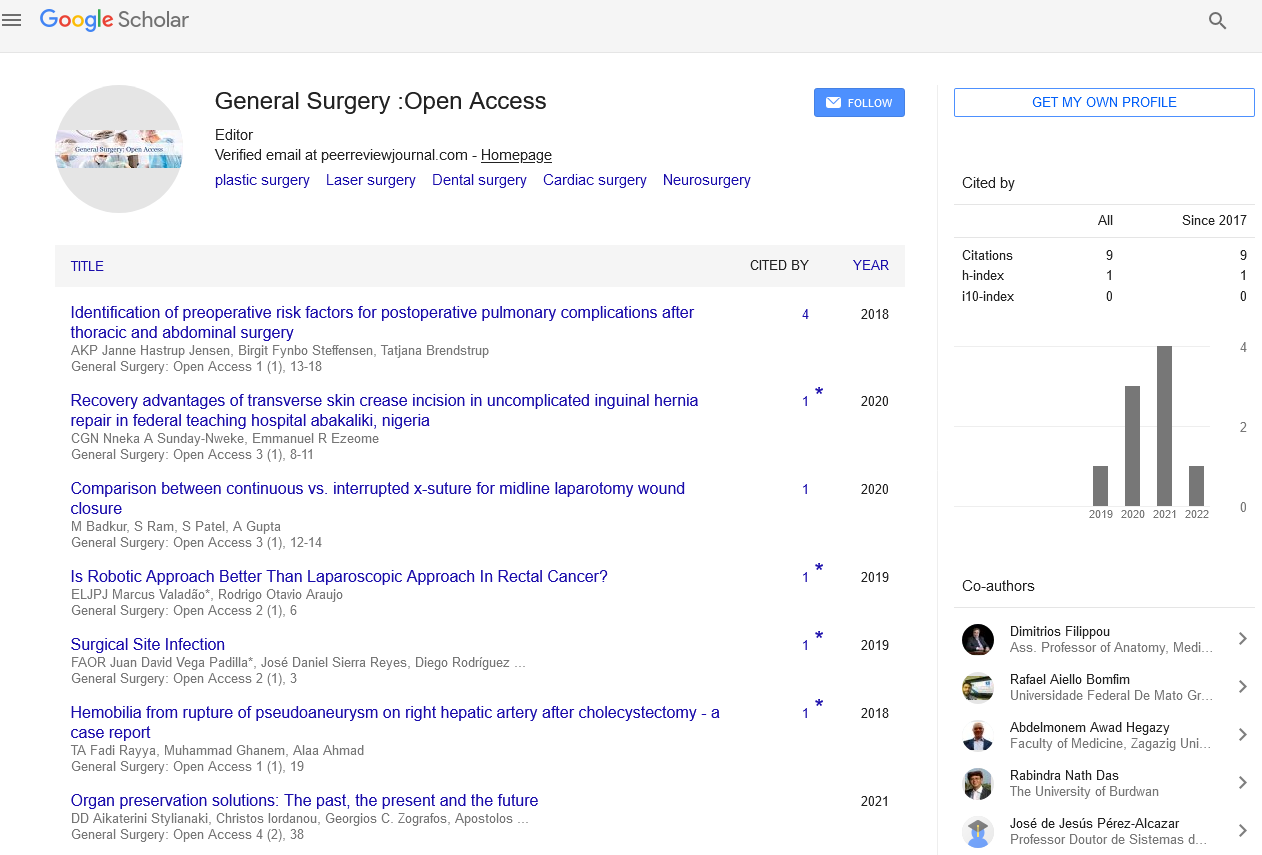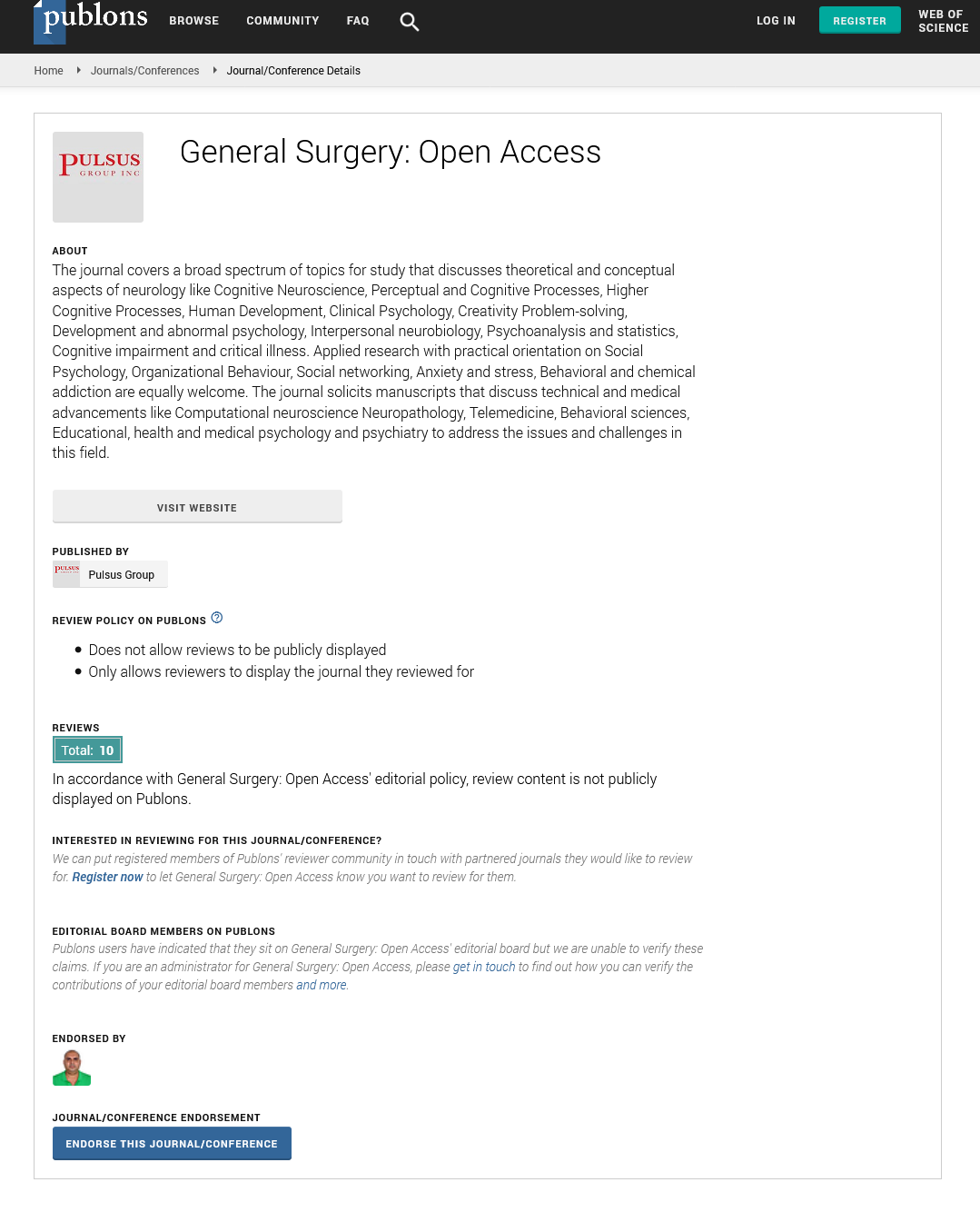Holistic approach to Ethics
Received: 19-Jan-2018 Accepted Date: Jan 25, 2018; Published: 19-Feb-2018
Citation: Kumar R. Holistic approach to ethics. Gen Surg: Open Access. 2018;1(1):5-6.
This open-access article is distributed under the terms of the Creative Commons Attribution Non-Commercial License (CC BY-NC) (http://creativecommons.org/licenses/by-nc/4.0/), which permits reuse, distribution and reproduction of the article, provided that the original work is properly cited and the reuse is restricted to noncommercial purposes. For commercial reuse, contact reprints@pulsus.com
Medical ethics are the one which are most important issue as there are conflict of interests between the government and medical institutions, between medical institutions and medical personnel, between physicians and patients with courts and media playing their roles. So there should be holiness towards ethics may it be personal, familial, social, professional or spiritual as media and courts are playing their roles.
In Doctor-patient relationships honesty & integrity, mutual respect, trust, empathy and mutual goals are very important. As a doctor one should know that our profession is one of the noblest professions since ancient times as it takes care of a person from its conception to whole life till last breath on this planet. Due to this reason doctors are regarded as next to God by society. So when a patient comes to you treat him like own mother, father, son or daughter irrespective of caste, creed, race and social status of patient.
Morality of many doctors is compromised because of greed for money and that is responsible for moral degradation and other troubles of consumer courts or laws depending upon country you live.
Sushruta and Charak were Godly reverence in their lifetime. They were neither wealthy nor very rich. Why can’t we become Charak and Sushruta now days? We are the same but our desires and greed has increased. God does not desire anything from anyone in this universe.
MAN – DESIRE = GOD
MAN + DESIRE = DOG.
Teaching ethics effects attitude of medical professionals [1,2]. So ethics training should be important subject during medical school and residency, including surgical residency [3,4]. And guidelines should be developed for ethics in clinical teaching and surgical residency programmes [4-6].
In Surgery we deal with confidential issues like, history, behavior, body, health & disease and patient is always at receiving end with trust in doctor & expect high ethical standards.
Any breach of ethical standards leaves harmful effects shaking the confidence in the system, so one should have a Holistic approach towards patients by maintaining the ethical standards to prevent media and legal implications.
One should follow the four basic principles of ethics concerned with Doctors [7]-
•Autonomy
•Beneficence
•Non maleficence
ALWAYS REMEMBER DIVINE LAWS:-
“GIVE THE BEST YOU HAVE. THE BEST SHALL COME BACK TO YOU”
“WHAT YOU SOW, THAT SHALL YOU REAP”
“WHAT IS DESTINED TO HAPPEN WILL HAPPEN and WHAT IS NOT WILL NEVER”.
So, why to desire/ Why to bother? Conduct ethical surgery according to ethical standards and respect human dignity and equality. Don’t adopt wrong means by violating ethical values as per WHO. All problems don’t start because of needs but because of greed to become rich overnight.
Conclusions
CPA and other legal laws according to country where we live has done irreparable damage of doctor-patient relationship. Law can never infuse emotional feelings in human relations and due to this reason both doctor and patient suffers.
Doctor should never offend others with ill-chosen remarks about race, sexuality and other sensitive matters and try to see God in every creature and everywhere.
A good surgeon has high ethical standards. Never bring feeling of doership i.e. ego in you. Remember our body work automatically by HIS power. So, doer is God’s power and not you.
Results are not in our hands. We make the wounds as surgeon and god heals it. So don’t guaranty 100% outcome of any treatment or surgery and do detailed counselling regarding diagnosis, investigations, treatment options, risks, complications, recurrence and mortality.
Our few words of sympathy from bottom of heart find no problems with patient and relatives.
Never criticize your professional colleague as it will bring very bad reputation to you, as patient understands your motive and ultimately reflects your morality.
Honestly know your limitations and never hesitate to refer patient to a place where there are better chances of treatment and safety of life.
Never forget to document all discussions with patient and relatives on record along with daily progress report and treatment and give detailed summary of diagnosis and surgical record at the time of referral or discharge.
Have good communication with patient and relatives with emotional touch and sympathy.
Medical ethical courses should be designed for surgeons throughout the world and more sessions should be created in conferences for presentations on ethics
Surgeons must know their anatomy, learn to incise, cut and suture so that it becomes second nature. The Spanish poet Gabriel Garcia Lorca reffered to the knife as a “Fish without scales” that penetrates deep into flesh [8].
Hospital Ethics Committees are must in institutes, ethics awareness programmes, and reports in the media asking for ethics to be made a mandatory part of curricula.
In many countries we are grappling on the basic questions of ethical professional practice.
So when we talk of ethics, it should be a Holistic approach in surgical practice
REFERENCES
- Sulmasy DP, Geller G, Levine DM, Faden RR. A randomized trial of ethics education for medical house officers. J Med Ethics. 1993; 19:157-63.
- Elger B S, Harding TW. Terminally ill patients and Jehovah's witnesses: teaching acceptance of patients' refusals to vital treatments. Med Educ. 2002; 36:479-488.
- McKneally MF, Singer PA. Bioethics for clinicians: 25. Teaching bioethics in the clinical setting. CMAJ. 2001; 164: 1163-7.
- Angelos P, Lafreniere R, Murphy TF, Rosen W. Ethical issues in surgical treatment and research. Curr Probl Surg. 2003; 40: 353-448.
- Guidelines for ethics in clinical teaching. Toronto: University of Toronto Faculty of Medicine 2002.
- Singer PA. Intimate examinations and other ethical challenges in medical education: Medical schools should develop effective guidelines and implement them [editorial]. BMJ. 2003; 326:62-3.
- Beauchamp T, Childress J; Principles of Biomedical Ethics, 7th Edition. Oxford University Press.
- Lorca GG. Blood Wedding (translated by Ted Hughes). Faber and Faber: London 1997.






